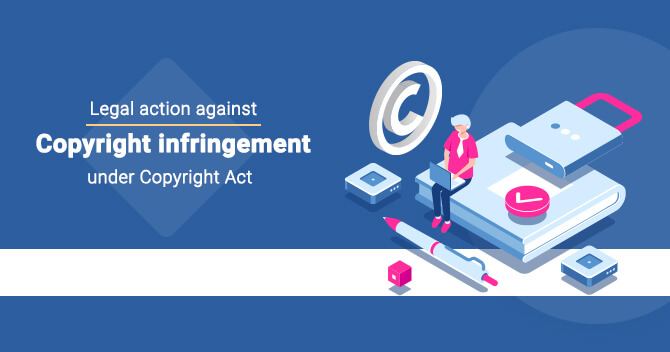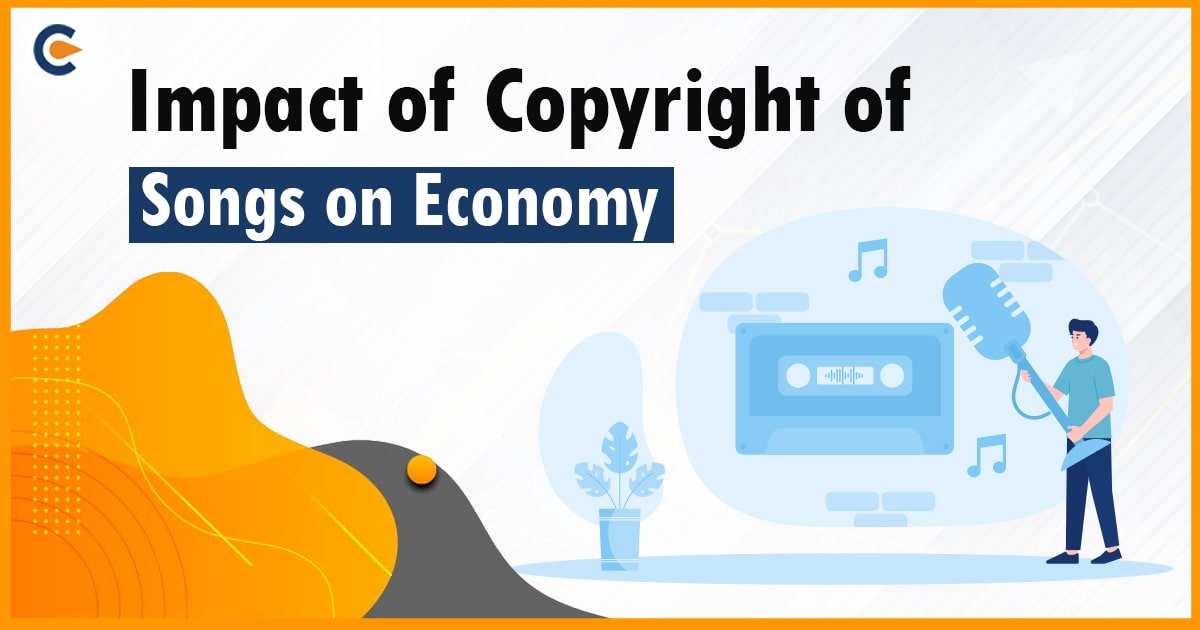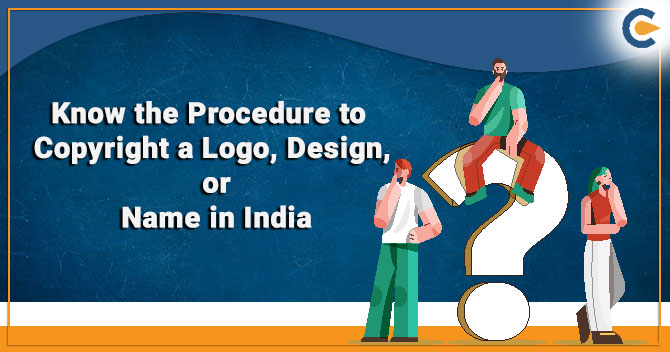The copyright is a legally certified document provided to people of the different fields of literature, drama, artistic and musical work, etc. for acknowledging their intellectual input. The main aim of copyright is to give exclusive rights or to authorize others to perform various acts in respect of the work. However, if anyone without authorization of the owner uses his copyright for any purpose, that will be copyright infringement. The main key focus of this blog is copyright infringement and remedies regarding the same.
What is Copyright Infringement?
When a person does anything or permits for profit without any granted license or assignment by the owner of the copyright that is deemed to be copyright infringement. According to section 51 of the Copyright Act 1957, copyright infringement is said to be made when a person does the following:
- When a person sells or hire or offer to sales or hire, or,
- When he distributes for the purpose of trade which affects the copyright of the owner, or,
- When he by way of trade exhibits in public, or,
- Imports it to India any infringing copies of work
Read our article:Limitations on Exclusive Rights and Exceptions to Copyright Infringement
Acts not covered under Copyright Infringement
According to section 52 of the Copyright Act 1957, the work which does not cover under copyright infringement is the following:
- A work used for research purposes either for private or personal use, or any work for criticism or review, or reporting of the lecture in public, or, use of current affairs or current events.
- The copies or adaption of a computer program by the lawful processor, in order to utilize such computer programme or to make the backup of the copies for temporary use against loss, destruction or damage.
- Any acts were necessary to obtain information for operating inter-operability of an independently created program by a lawful processor.
- Any observation, study or test for the functioning of the computer program under the set ideas and principles which underlines any elements of the program is not copyright infringement.
- The making of duplicate copies or adaption of the computer program for the personal use and not for any commercial use is not infringed.
- The transient or incidental storage of a work or performance in the technical process of electronic transmission or communication to the public is not copyright infringement.
- For the purpose of providing electronic links, access or integration where the use of such links, access or integration is not prohibited by the right holder is not copyright infringement.
- The reproduce for any work for the purpose of the judicial proceeding.
- To publish of any work made by the Legislature or by the Secretariat who is member of any legislative house of the parliament.
- To reproduce any certified copy made or supplied in accordance with the law.
- To extracts the words from any published literary or dramatic work for the purpose of reading or recitation.
- Any publication intended for the instructional use or used in any advertisement on behalf of the publisher.
- To reproduce any work made by the teacher for the purpose of lectures, or any part answered during the examination or answers to questions.
- The act or performance performed in the educational institutions related to any dramatic or musical work or a cinematographic film or musical work in front of a limited audience.
- Any recording utilized for the public in an enclosed hall or any residential premises or in any club or any similar organization which is not established for profit-making.
- Any performance performed related to literary, dramatic or musical work in any club or society for a non-paying audience or for the religious benefits.
- To store work in an electronic medium for a non-commercial public library.
- The copies made of any book is not more than three under the direction of the in charge of the public library if the book is not available for sale in India.
- Any research or study does for private use or used for the publication of an unpublished literary, dramatic or musical work kept in the library, museum or any other public institution.
- Any matter which has to be published in
• any official gazette or
• any act published along with any commentary or
• any publications of the report of any committee, commission, council, board or any other body appointed by the government.
• any judgment, or order of a court or tribunal or any other judicial authority
- Any publication or production of translation in any Indian language of an act or order if the translation of such acts, rules or orders is not published by the government or in case not available for the public.
- The making or publishing of a painting or drawing or engraving or photograph of work of the architecture
- The inclusion in a cinematograph film of an artistic work permanently situated in any public place for which the public has access.
- The use of artistic work by an author where the author is not the owner of such work
- The converting of a three-dimensional object from the two dimensional of artistic work for the purpose of industrial application of any functional part.
- The reconstruction of the building or structure of the original constructed building according to the original architectural designs.
- The ephemeral recording by the broadcasting organization by using its own facilities has the right to broadcast and the retention of such recording for the archival purposes for on the ground of its exceptional documentary character.
- The performance performed related to literary, dramatic or musical work to the public for the ceremony held by the Central Government or the State government or any local authority.
- Any work adapted, reproduced, issued of copies or communicated of any work for the person having a disability or for an organization which is benefiting to the person with disabilities.
- The import of copies of literary or artistic work, company logos or promotional or explanatory material that is purely incidental to other goods or products being imported lawfully.
Who is the owner for the purpose of copyright infringement?
The owner of the copyright has remedies regarding copyright infringement. According to section 54 of the Copyright Act 1957[1], the owner of the copyright is one who is an exclusive licensee. Also in the case of an anonymous or pseudonymous work of literary, dramatic, artistic or musical work, the identified author or joint authors (whose identity is disclosed in public) or the publisher (when the author is not known) or is established by the satisfaction of the Appellate Court, would be treated as an owner of the copyright.
Civil remedies for copyright infringement
The owner of the copyright is entitled to the remedies by way of injunction, damages, accounts or otherwise, that is conferred by law for the copyright infringement under section 55 of the act. The onus of the proof lies to the defendant to prove that he was not aware and had no reasonable ground for copyright infringement. The costs of all parties in any proceedings in respect of the copyright infringement of shall be at the discretion of the court.
Authors remedy against copyright infringement
The special rights of the author are given under section 57 of the act regarding copyright infringement. The author of the work can claim the authorship of the work. The author can also restrain, or claim damages in respect of any distortion, mutilation, modification or any other act related to said work which would be prejudicial to his honour or reputation.
Owners right against copyright infringement
The owner has the right to take back all the infringing copies of his work and also all plates used or intended to be used in the production of the infringing copies. The owner may accordingly file the proceedings for the recovery of possession for the same under section 58.
However, the owner will not be entitled to the remedy if the defendant proves the following:
- That he was not aware and had no reasonable grounds to believe that copyright subsisted in work of such infringed copies
- that he had no reasonable grounds to believe that such plates were involved in copyright infringement.
Penalities for the copyright infringement under this act
- Under section 63 if any person knowingly infringes or abets to infringement of the copyright shall be liable for the imprisonment of not less than six months which may extend to 3 years. The fine imposed of Rs, 50,000 which may extend to Rs 2 Lakhs.
- Under section 63(A) if any person repeated the copyright infringement shall be punished with the imprisonment of not less than one year and which may extend to 3 Lakhs. The fine imposed of Rs 1 Lakhs which may extend to Rs 2 Lakhs.
- Under section 63(B) if any person knowingly makes infringing copies of the computer program shall be liable for the imprisonment of not less than seven days which may extend to 3 years — the imposition of a fine of Rs, 50,000 which may extend to Rs 2 Lakhs.
- Under section 64, The police officer may seize the infringing copies without a warrant. The owner or interested person can make an application before the magistrate within 15 days of such seizure related to infringing copies. On hearing to the complainant, the magistrate will pass an order for inquiry as he thinks fit.
Penalty for making false entries in the register
Under section 67 person who makes false entries in register of the copyright or falsely purporting to make a copy of any entry kept under this act shall be liable for the imprisonment which may extend to 1 year or fine or both.
Penalty for making false statements to any officer or authority
Under section 68, a person who makes any false statements to deceive any officer or authority for the purpose of this act. Also, if the person influences to do or to omit any act in relation to the execution of the provisions under this act shall be liable for the imprisonment which may extend to 1 year or fine or both.
Penalties to companies for copyright infringement
Under section 69 when an offence committed by a company, it is proved that the offence was committed with the consent or connivance of any director, manager, secretary or another officer of the company then shall be liable to be proceeded against and punished accordingly.
Takeaway
The owner of copyright work has the exclusive rights which cannot be used or infringed by any other person. Until and unless the owner does not assign any right to another person no one can use is copyright. The Corpbiz helps in the copyright registration and also provides legal assistance regarding the cases related to copyright infringement.
Read our article:How To Obtain Copyright Registration in India?











